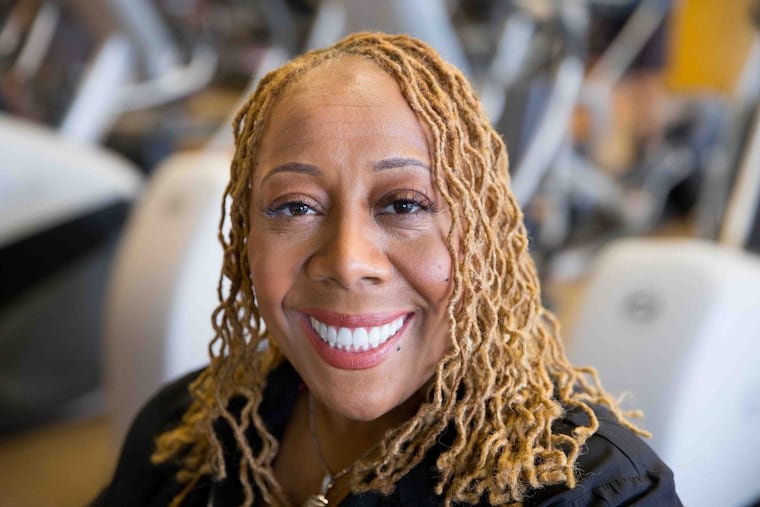Patty Jackson: I ignored the warning signs of stroke. Don't make the same mistake
Out of nowhere, in Nov. 2015, I collapsed. But I got right back up and kept moving - I had work to do! I didn't know then that depending on the severity of a stroke, it might not immediately present in a dramatic way.

I've been on the radio for 35 years, and I love my job at WDAS. I love my job so much that often it doesn't even seem like a job, which makes it hard for me to realize how over-worked I might be getting. So over-worked, in fact, that I had a stroke three years ago – my body's way of telling me to slow down.
My mother had suffered a stroke when she was 81, and I was her primary caregiver until she passed away. Taking care of my mother and my son while juggling the demanding schedule of my career was stressful. But then in the fall of 2015 I lost my mother, which took a toll on my emotional strength like nothing ever had before.
But I trudged on — working at the station seven days a week and doing numerous appearances after work. Nothing like a busy schedule to numb the mind, right?
Out of nowhere, in Nov. 2015, I collapsed. I didn't stumble over anything. I didn't trip. I just suddenly hit the ground. But I got right back up and kept moving – I had work to do!
That particular week was packed. I had a big show on the books, so I ignored the fact that my right side felt weak.
I didn't know then that depending on the severity of a stroke, it might not immediately present in a dramatic way. Two days went by before I got around to visiting a doctor. By then, my right side had continued to weaken, to the point where I could barely lift it. When doctors told me I'd had a stroke, I got back in my car, drove home to get my house an child care in order, and then drove myself to a hospital.
At the hospital, my condition quickly worsened. Soon I couldn't pick up my right arm at all. I couldn't hold a pen. I couldn't even see straight. My body was saying, "We need a break." I was in the hospital for weeks recovering and going through rehab to regain use of the right side of my body, and regaining strength.
A month after being released, I was back in the studio. I thought I needed to get back to doing what I do, to help me heal.
My return to work came with a few new rules. No more overscheduling. No more ignoring my own health and wellbeing to get the job done.
My mother's stroke should have been my first warning sign. A family history of stroke can raise your risk, as some strokes can be caused by genetic disorders.
My gender and race also made me more susceptible. Statistics show that African Americans have a much higher risk of death from stroke than Caucasians. And women have more strokes than men, and it is often more fatal for women. As women, we tend to prioritize the needs of everyone around us above our own. But we must make a change.
Age is another risk factor. The likelihood of having a stroke doubles every 10 years after the age of 55. But stroke can happen at any age – I was only 52 at the time of my stroke, and even children and babies can be at risk.
It's important to know that high blood pressure is public enemy No. 1 for strokes. Three out of four people who suffer a stroke have high blood pressure, which is defined as readings above 130 over 80. Managing high blood pressure will help decrease your stroke risk. Certain diet changes can help keep your blood pressure in check. More than 70 percent of Americans' sodium intake comes from packaged and restaurant foods. Philadelphia City Council is working to introduce a sodium safety warning label on restaurant menu items exceeding 2,300 mg of sodium in a single meal. This will help those of us who like to eat out (myself included) make informed decisions about our sodium intake.
In Philadelphia, roughly 2,136 out of 100,000 deaths are caused by stroke. Don't become a statistic. Make regular appointments with your doctor. Be your own health care advocate. Listen to your body and take care of yourself. Don't let a stroke be your wake-up call.
Patty Jackson is a mid-day radio host at WDASFM. She also hosts Sunday night oldies from 7 p.m. to midnight.
Note from the American Heart Association: May is National Stroke Awareness Month. Stroke is the fifth leading cause of death in the United States, responsible for one in every 20 deaths. An estimated 7.2 million Americans 20 years and older have had a stroke. However, 80 percent of strokes are preventable and are largely treatable. The American Heart Association and American Stroke Association encourage you to remember F.A.S.T. to recognize and react to the warning signs of stroke:
Face Drooping
Arm weakness
Speech difficulty
Time to call 911